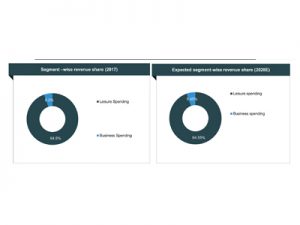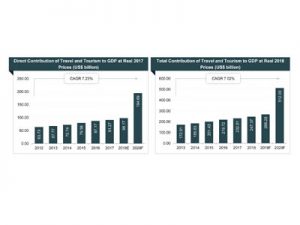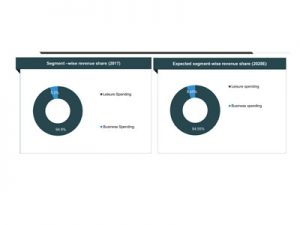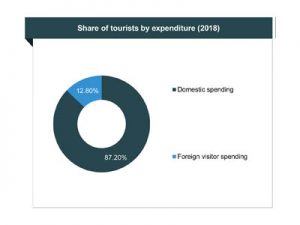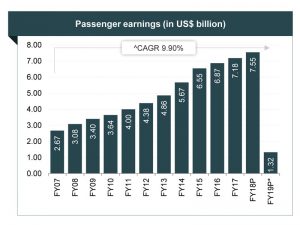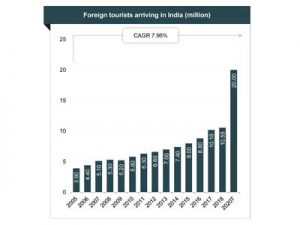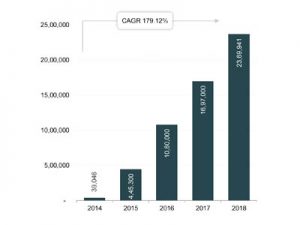A recent report by India Brand Equity Foundation (IBEF) has claimed that the share of revenues from leisure travel to the total tourism revenue stood around 94.8 percent in 2018. Leisure travel spending reached US$234.16 billion in 2018 and is expected to reach US$432.3 billion by 2028, the report stated. Business travel revenues were US$12.84 billion in 2018 and are projected to increase to US$24.4 billion by 2028.
Read More »Indian tourism to contribute Rs 12.68 trillion to GDP by 2028
The India Brand Equity Foundation (IBEF), in its latest report titled ‘Tourism and Hospitality’ has ranked India as eighth in the world in 2017 in terms of absolute direct contribution of travel and tourism to its GDP. The tourism and hospitality sector’s direct contribution to GDP in 2017, was Rs 5.94 trillion (US$91.27billion). This is expected to reach Rs 12.68 trillion (US$194.69billion) in 2028, implying a CAGR of 7.23 percent during 2012-28. According to 2018 report of the World Travel and Tourism Council (WTTC), India was ranked third in the tourism sector. India generated revenue of about US$247 billion in 2018
Read More »Leisure travel spend to reach US$ 432.3bn by 2028
A recent report by India Brand Equity Foundation on tourism and hospitality revealed that the share of revenues from leisure travel to the total tourism revenue stood around 94.8 per cent in 2018. According to statistics shared in the report, leisure travel spending reached US$ 234.16 billion in 2018 and is expected to reach US$432.3 billion by 2028. On the other hand, business travel revenues were US$ 12.84 billion in 2018 and are projected to increase to US$ 24.4 billion by 2028.
Read More »Domestic travel spending 74.4 per cent more than foreign tourist spend in 2018
A report by India Brand Equity foundation, titled Tourism & Hospitality, revealed that domestic tourists will lead the growth of tourism in terms of spending. The share of foreign tourist spending in 2018 was 12.8 per cent, while that of domestic visitor spending was 87.2 per cent, which was 74.4 per cent more. The report estimated the domestic travel revenues at US$ 215.38 billion in 2018, which is anticipated to further increase to US$ 40.5.8 billion by 2028.
Read More »Passenger earnings of Indian Railways increases at a CAGR of 10% in 2018
Revenues from the passenger segment of Indian Railways have increased at a CAGR of 9.90 per cent to US$ 7.55 billion in FY18 from US$ 2.67 billion in FY07, according to a Railways report by India Brand Equity Foundation (IBEF). Passenger earnings of Indian Railways stood at Rs 8,534.71 crore (US$ 1.32 billion) during April-May 2018. With eight metro rail networks spread over a length of 370 kilometres (km) and over two dozen metro projects lined up, India’s metro rail network is expanding at a fast pace.
Read More »Foreign tourist arrivals in India up 5.3% in January YoY
During 2018, foreign tourist arrivals (FTAs) in India stood at 10.55 million, achieving a growth rate of 5.20 per cent year-on-year, according to a report by India Brand Equity Foundation (IBEF). FTAs in January 2019 stood at 1.10 million, up 5.30 per cent compared to 1.05 million year-on-year. Growth in tourist arrivals has been due to flexible government policies, developed rail and road infrastructure, ease in availability of e-Visas to foreign tourists. During January 2019, arrivals through etourist visa increased by 21.10 per cent year-on-year to 0.29 million. The Government of India has set a target of 20 million foreign tourist arrivals (FTAs) by 2020 and double the foreign exchange earnings as well. The Government of India is working to achieve 1 per cent share in world’s international tourist arrivals by 2020 and 2 per cent share by 2025.
Read More »Arrivals in India through e-tourist visa increases at a CAGR of 180% during 2014-18
In 2018, 23,69,941 tourists have arrived in India through e-tourist visa, according to a report by India Brand Equity Foundation (IBEF). Tourist arrivals through increased at a CAGR of 251.59 per cent during 2014-17 to reach 1,697,000 tourists in 2017. The government has recently made a series of amendments in the e-visa regime to make it more tourist-friendly. The duration of stay in India of e-tourist and e-business visas is maximum up to one year with multiple entry subject to the stay stipulations. Also, the existing restriction of allowing foreigners for a maximum of three times has also been removed. On e-tourist visa, continuous stay during each visit shall not exceed 90 days in case of nationals of all countries who are eligible for grant of e-visa except nationals of USA, UK, Canada and Japan. In case of nationals of USA, UK, Canada and Japan, continuous stay during each visit shall not exceed 180 days. In all cases, no registration will be required. On the changes in e-business visa, continuous stay during each visit shall not exceed 180 days in case of nationals of all countries who are eligible for grant of e-visa. No registration will be required if the stay is for a period of less than 180 days. The e-visa is valid for entry through two more designated airports (Bhubaneswar and Port Blair), raising the total number of such airports to 28.
Read More » Tourism Breaking News
Tourism Breaking News
